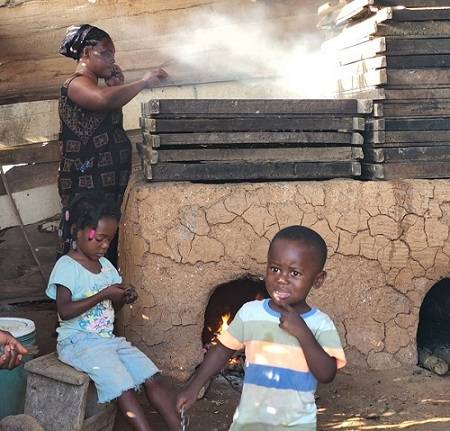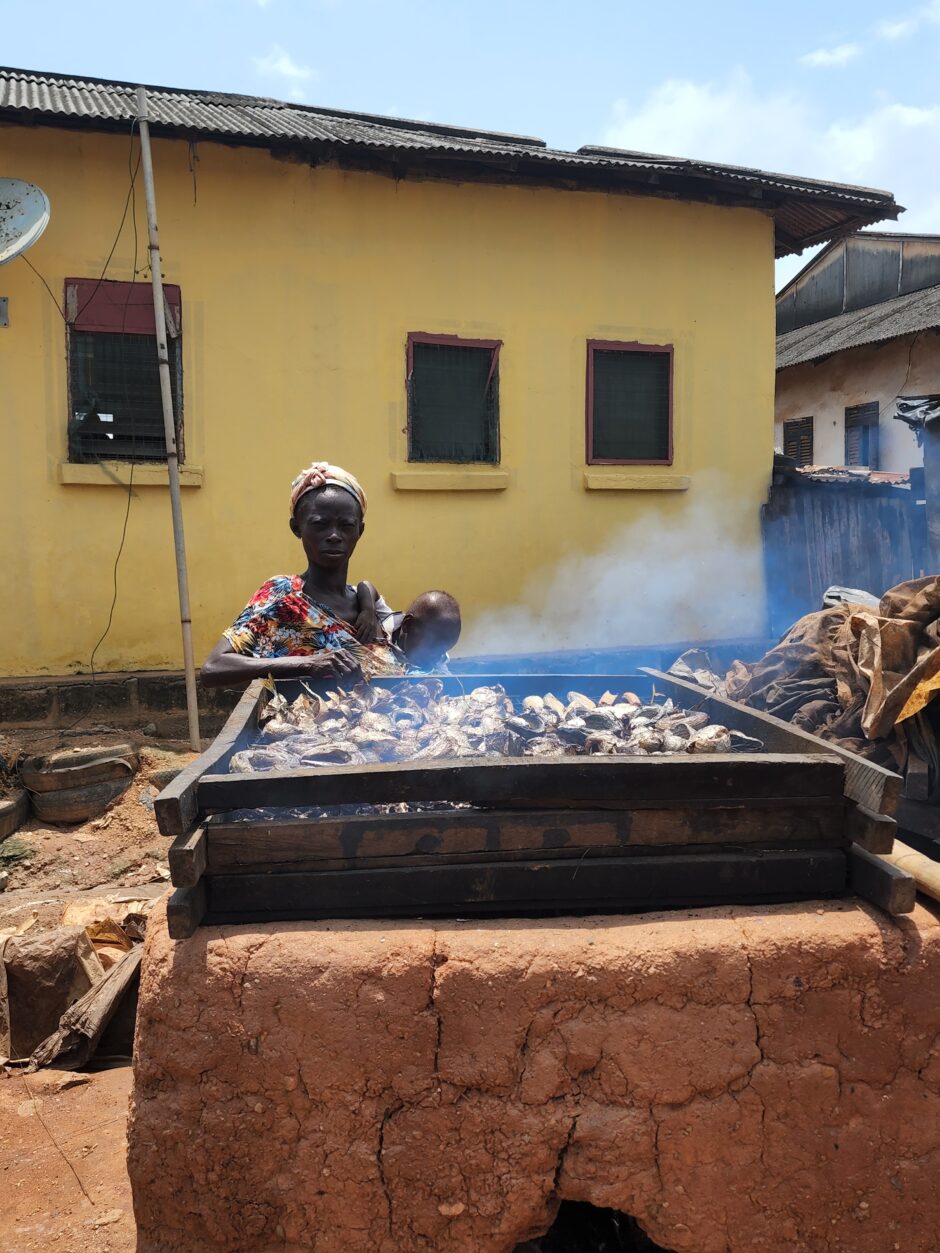
Moree, Abura-Asebu-Kwamankese District – When his mother fell ill and started coughing incessantly, Kojo Ansong and his siblings thought it was a minor infection that would go away with some over-the-counter medication. It didn’t. Sixty two-year-old Christiana Ntiamoah’s coughs became raspier, more frequent and she sometimes coughed up blood.
A doctor in their fishing community here in the Abura-Asebu-Kwamankese District of the Central Region, thought there was a problem with Mrs Ntiamoah’s lungs. They referred her to the Korle Bu Teaching Hospital in Accra, where, after a battery of tests, doctors told Mr Ansong, 37, that his mother had lung cancer. The cost of the prolonged and grueling treatment was too much and the likelihood she would be cured was low. The family decided against treatment. Mrs Ntiamoah suffered greatly until the end.
“My mother died a painful death. At some point she could not even breath properly,” Mr Ansong says. “She was always struggling in excruciating pain until she finally gave up the ghost.”
Doctors suspect the cancer that killed Mrs Ntiamoah came from her long years of exposure to the toxic smoke emanating from the traditional oven she used to smoke fish for sale. Like many women in Moree she made her living smoking fish to provide for her children and other dependents. But smoking fish is also how many of them die according to doctors. And Mr Ansong is worried that more women in Moree will suffer the same fate as his mother.
In Moree, like many coastal communities in Ghana, men do the fishing and women smoke the fish to dry them as a means of preservation. Tradition forbids women from joining men on fishing expeditions and men deem fish smoking as the domain of women. That means women in such communities are disproportionately exposed to the health risks of fish smoking.
Women spend a minimum of six hours every day engulfed by the smoke emanating from their basic wood-fired mud ovens. A research in coastal Ghana by the University of Michigan found that exposure to both carbon monoxide and particulate matter (small airborne particles called PM2.5 that include soot, smoke and dust) was 2.6 times greater among fish smokers than in a group of non smokers. The PM2.5 exposures exceeded World Health Organization (WHO) safety guidelines.

Many of the women here complain of dizziness, headaches, coughs, shortness of breath, chest pains and poor eyesight. Children have asthma and developmental challenges. Doctors say it is almost certainly caused by their exposure to harmful smoke from their traditional fish smoking activities.
“This fish smoking activity involves every member of the family, including children,” says Dr Antwi-Boasiako Amoah, Director of Climate Vulnerabilities and Adaptation at the Environmental Protection Agency (EPA) who co-authored the study. “All these individuals and their neighbours are affected by the smoke and its toxicity which accumulate over time and cause harm to the body. The sad part of this whole issue is that those affected do not believe that certain ailments their relatives who were engaged in the fish smoking business had, were likely caused by their exposure to the smoke.”
Air pollution in general is a silent killer of Ghanaians. Fish smoking is just one of many types of air pollution that are concerning health experts. According to recent air pollution data issued by the WHO people in Ghana are more likely to die from air pollution – from transport, industry and other pollutants – than those in comparable countries such as Kenya and Rwanda. The WHO estimates that 28,000 Ghanaians die prematurely every year as a result of air pollution, making it the second highest risk factor for death after malnutrition. Around the world more than 99% of people are breathing air that exceeds the WHO air quality guidelines, and air pollution causes 7 million premature deaths every year, including more than half a million children under five.
Unlike people in some communities, most people here in Moree know that their main source of livelihood could also be leading them to early graves. The local healthcare providers are warning them constantly. Mary Nunoo, 46, says she has been in the smoked fish business for more than a decade and does not see herself stopping any time soon even though she knows the smoke is likely killing her.
“I feel the eye irritation the moment I set the fire and the smoke start coming out,” she says. “The irritation in my eyes is followed by a cough. When the smoke becomes too much, I take few steps away from the oven and only get very close again to check the fish and prevent them from getting burnt. Sometimes the headache does not stop until I take paracetamol. The healthcare professionals at the local health center always warn us about the dangers of the smoke we are exposed to, and I also know of someone who has lost her sight due to the long-term exposure to smoke. But we cannot stop this business since it is our only source of livelihood.”
Mary’s husband, 60-year-old Kwesi Abiri, says he knows many women who have lost their lives after battling ailments which their doctors said were caused by their exposure to smoke.
It’s not only older and middle-aged women who are exposed to fish smoking. Girls and younger women are often required to help their mothers and guardians while they are fish smoking and babies and infants are exposed while in their mothers’ care. In Moree many women are smoking fish with babies strapped on their backs and young children beside them. Exposure to air pollution in infancy is particularly dangerous leaving the children with a higher risk of illnesses such as asthma and impaired body and brain development.
Esi Tawiah, 21, says she has been experiencing difficulties with her breathing. A student and single mother to a four-year-old son, she says she has no other choice than to smoke fish to fund her education. She sees that as her only path to better prospects for herself and her son. Ms Tawiah says she has difficulty reading from the board in school because of her sore eyes. But she says she has no choice but to go back to fish smoking.
“If I do not go, I will not get money to fend for myself and my son,” she says. “This work is making me sick, but I do not have any other choice. If I find a safer alternative I will not hesitate to quit.”
There are ways to make fish smoking safer. Dr Amoah advises the fish smokers to keep children away from the smoking process. He also tells women to do the fish smoking in an open area as much as possible to dilute the effects of the harmful smoke.
Dr Amoah says fish smokers must make deliberate efforts to reduce the number of hours they spend smoking fish each day, “even if it means finding an alternative means of livelihood.” Dr Amoah also suggests introducing the fish mongers to safe alternatives like modern ovens for smoking fish.
Dr Juliet Quansah, a medical oncologist, advocates for an increase in awareness creation among communities with high numbers of women who are into the fish smoking business, in order to save lives.
Dr Amoah, at the EPA agrees awareness creation regarding the health implications of exposure to smoke would go a long way to help save lives. But he says the EPA lacks adequate funds for such initiatives. He urges the Ghana Health Service (GHS) and district assemblies to focus on implementing measures to address air pollution in general and pollution from fish smoking in particular.
***
This story was a collaboration between the Ghanaian Times and New Narratives. Funding was provided by the Clean Air Fund. The funder had no say in the content of the story.
